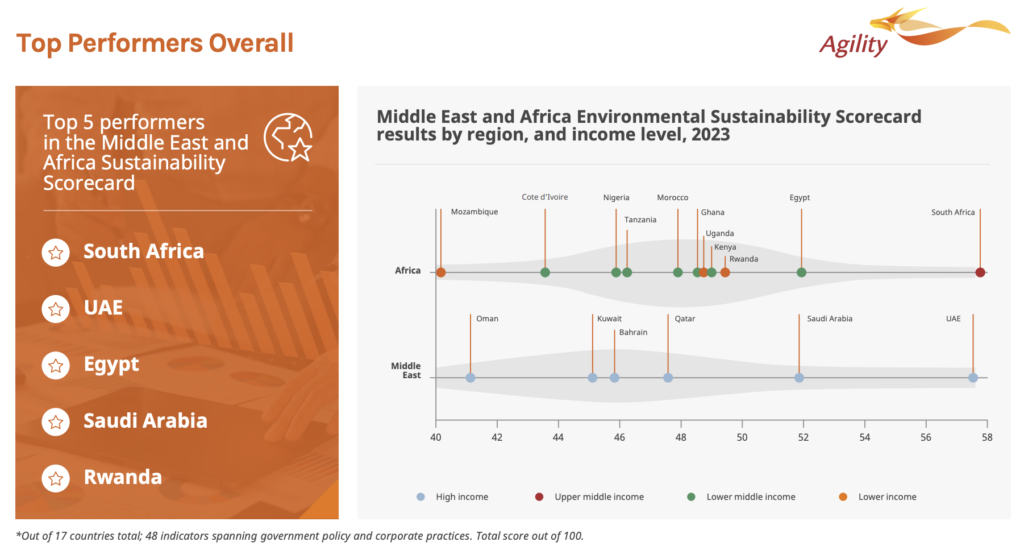The United Arab Emirates, Saudi Arabia and Qatar are exerting efforts in the GCC to fight climate change in several key areas despite their fossil fuel dependency, according to a new report that compares government and business sustainability policies, investment and actions across the Middle East and Africa.
South Africa, the United Arab Emirates, Egypt and Saudi Arabia rank at the top of the 17-country Middle East and Africa Evironmental Sustainability Scorecard, which was released Thursday. The scorecard is the most detailed examination to date of country performance in environmental sustainability outcomes, government policies, and corporate practices in the two regions.
The report that was commission by Agility, a global supply chain services company based in Kuwait, concludes that the 17 countries covered “are relative ‘late comers’ to global sustainable development but at the same time represent regions that are rapidly stepping-up their sustainability strategies, programs and investments.”
The findings were compiled by Horizon Group, a Geneva-based firm that specializes in research and analysis for governments, international organisations, and leading businesses worldwide. Horizon surveyed 647 business executives in the 17 countries.
“All six hydrocarbon-intensive GCC countries are at the bottom of the 17-nation ranking in Energy Transition, which looks at energy supply, and renewable energy use, subsidies and taxes, along with energy-transition agendas at national and corporate levels. Leaders in Energy Transition are: Uganda, Nigeria, Rwanda, Kenya and South Africa,” the report said.
GCC countries are investing heavily in sustainable development, with the current World Bank projections forecast combined GCC economic output to be $6 trillion by 2050. But “embracing a strategic green growth approach to economic diversification could potentially elevate this figure to over $13 trillion,” the report says, citing World Bank estimates.
The scorecard uses 48 performance and progress indicators to compare countries. The indicators include data, regulatory frameworks, policy assessments, incentives and corporate practices across six pillar areas: green investment and technology; sustainable infrastructure and transport; governance and reporting; energy transition; environmental ecosystems; and circularity.
Key Findings:
- One through 17, the countries rank: South Africa, UAE, Egypt, Saudi Arabia, Rwanda, Kenya, Uganda, Ghana, Morocco, Qatar, Tanzania, Nigeria, Bahrain, Kuwait, Cote d’Ivoire, Oman, Mozambique.
- Business isn’t paying attention to COP. Eighty-two percent of African businesses and 49% of Middle East businesses are not aware of the UN-led COP process that nations are using to push and measure efforts to tackle climate change. Few companies use COP to set their sustainability targets.
- Climate change is hurting businesses. Ninety-seven percent of companies say their business has been affected by climate change, and 49% say climate change has caused “severe damage” or has a “significant and growing” impact on them.
- Governments are leading as businesses play catch up. When it comes to climate action, governments are outpacing the private sector in both the Middle East and Africa.
- No one size fits all. Different countries have different sustainability priorities based on income, economic strengths, energy dependency, and other factors. High-income, energy-producing Gulf countries generally invest more in sustainable infrastructure and ecosystems. African economies perform best in energy conservation and consumption.
- Green investment is expensive. High- and middle-income countries are investing the most: Qatar, UAE, Morocco and Saudi Arabia.
- Africa is focused on green transport. Uganda, Nigeria, Rwanda, Kenya and South Africa are tops in the move to non-fossil fuels for transport. Hydrocarbon producing Gulf countries are focused more on green buildings. For Gulf countries, the transition to cleaner energy is complicated by energy-intensive national priorities: the desire to boost manufacturing and the need for desalinated water.
- Waste management, consumption are tied to wealth. High-income countries are doing more to manage waste sustainably. Poorer ones do more to constrain consumption. Overall Egypt, South Africa, Bahrain and UAE perform best in “circularity” – cutting waste, encouraging recycling and sustainable production, and lowering consumption.






